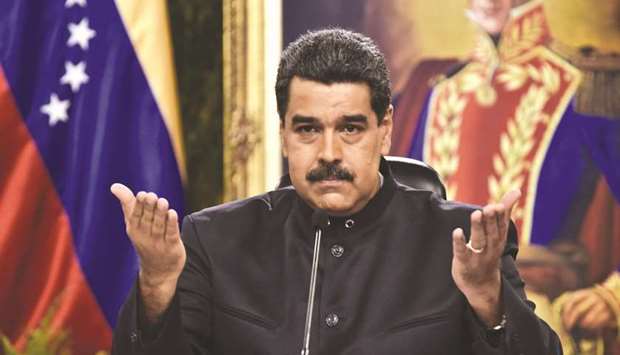The Trump administration on Friday barred the purchase in US markets of new securities issued by the government and its state oil company and blocked dealing in some existing bonds owned by the country’s public sector to further clamp down on President Nicolas Maduro’s autocratic regime. The US, which will still allow the continued import of Venezuela’s lifeblood oil, acted in response to Maduro’s moves to consolidate authority amid a crippling recession and months of violent protests.
“Today’s executive order demonstrates the US government’s condemnation of tyranny and dictatorship in Venezuela,” Treasury Secretary Steven Mnuchin said at a briefing. “The Maduro regime has consistently shown hostility to the rule of law, democratic institutions and the Venezuelan people. This has been a catastrophe for the country.”
The measures follow sanctions on top officials, and decrease manoeuvring room for a nation fast running out of money. Venezuela has $3.5bn in bond payments coming due by November, which the government will struggle to pay as reserves dwindle. In the meantime, the country has been ravaged by shortage of food and medicine, and its people increasingly go hungry.
Maduro said in a Twitter post that he was undeterred.
“The people of Venezuela will respond with dignity and firmness to the imperialist attacks, to guarantee the economic sovereignty of the country,” he wrote.
Chancellor Jorge Arreaza, speaking at UN Security Council, said the government was studying how to respond “to protect our people.”
“The US wants to govern Latin America,” he said. “Maduro has grown tired of calling for dialogue with the US president. God willing, President Trump understands it’s time for dialogue.”
The White House said in a statement that the measures were calibrated to restrain the government while sparing a suffering people. The Treasury Department will issue licenses for some transactions “to mitigate harm,” according to the statement. Trading will be allowed for most existing Venezuelan bonds in secondary markets and as short-term financing for most commercial trade, such as the import and export of petroleum.
The order also largely exempts Citgo Petroleum Corp, the US subsidiary of the state-owned oil company Petroleos de Venezuela. Citgo contributed $500,000 to Trump’s inaugural fund, Federal Election Commission records show. The company hadn’t contributed to inaugurations in 2005, 2009 or 2013.
Maduro “has financed his regime by hollowing out Venezuela, through economic mismanagement, corruption and the assumption of onerous debt,” Mnuchin said. The order will prevent Venezuelan government entities that already own the country’s debt from selling it in the secondary market. It bans purchases of new equity and debt issued by Venezuela with a maturity greater than 30 days, and by PDVSA with a maturity greater than 90 days.
The existing bonds targeted by the sanctions are due in 2036 and were issued by Venezuela late last year to two government entities and had, in recent months, been shopped around in an effort to raise cash. Opposition leaders criticised a transaction in May in which Goldman Sachs Asset Management bought almost $3bn of securities from the central bank through a broker, and have called for an investigation. Those bonds will be unaffected.
The Treasury Department’s Office of Foreign Assets Control issued a list of Venezuelan securities that can be traded.
Some institutions have already implemented similar measures. Credit Suisse Group this month barred traders from buying or selling certain Venezuelan securities as well as any new notes. The lender also restricted business with Venezuelan private individuals and companies.
With Venezuela’s average borrowing cost at about 32%, it’s unlikely the nation would have tapped debt markets for fresh cash. But the ban is designed to prevent investors from engaging in liability management, and, if Venezuela can’t pay its debt, a restructuring. Until now, the government has made repayment a priority, and has cut spending for crucial imports in order to do so.

